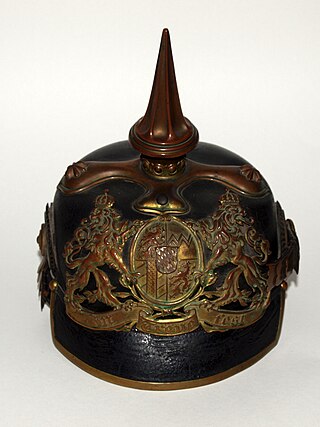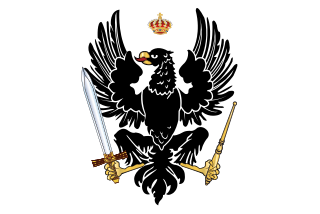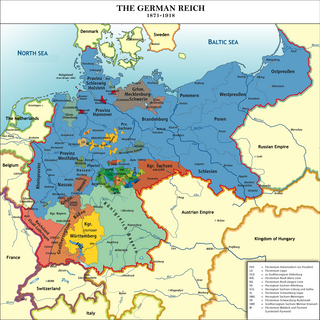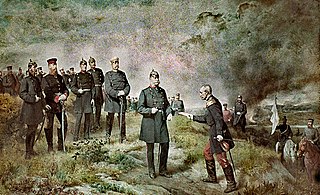
Frederick William I, known as the Soldier King, was King in Prussia and Elector of Brandenburg from 1713 till his death in 1740, as well as Prince of Neuchâtel.

The Pickelhaube, also Pickelhelm, is a spiked leather or metal helmet that was worn in the 19th and 20th centuries by Prussian and German soldiers of all ranks, firefighters and police. Although it is typically associated with the Prussian Army, which adopted it in 1842–43, the helmet was widely imitated by other armies during that period. It is still worn today as part of ceremonial wear in the militaries of certain countries, such as Sweden, Chile, and Colombia.

Friedrich Wilhelm August Heinrich Ferdinand von Steuben, also referred to as Baron von Steuben, was a Prussian military officer who played a leading role in the American Revolutionary War by reforming the Continental Army into a disciplined and professional fighting force. His contributions marked a significant improvement in the performance of U.S. troops, and he is consequently regarded as one of the fathers of the United States Army.

Frederick II was the monarch of Prussia from 1740 until 1786. He was the last Hohenzollern monarch titled King in Prussia, declaring himself King of Prussia after annexing Royal Prussia from the Polish–Lithuanian Commonwealth in 1772. His most significant accomplishments include his military successes in the Silesian wars, his reorganisation of the Prussian Army, the First Partition of Poland, and his patronage of the arts and the Enlightenment. Prussia greatly increased its territories and became a major military power in Europe under his rule. He became known as Frederick the Great and was nicknamed "Old Fritz".

Militarism is the belief or the desire of a government or a people that a state should maintain a strong military capability and to use it aggressively to expand national interests and/or values. It may also imply the glorification of the military and of the ideals of a professional military class and the "predominance of the armed forces in the administration or policy of the state".

Frederick William III was King of Prussia from 16 November 1797 until his death in 1840. He was concurrently Elector of Brandenburg in the Holy Roman Empire until 6 August 1806, when the empire was dissolved.

Brandenburg-Prussia is the historiographic denomination for the early modern realm of the Brandenburgian Hohenzollerns between 1618 and 1701. Based in the Electorate of Brandenburg, the main branch of the Hohenzollern intermarried with the branch ruling the Duchy of Prussia, and secured succession upon the latter's extinction in the male line in 1618. Another consequence of intermarriage was the incorporation of the lower Rhenish principalities of Cleves, Mark and Ravensberg after the Treaty of Xanten in 1614.

The Kingdom of Prussia constituted the German state of Prussia between 1701 and 1918. It was the driving force behind the unification of Germany in 1866 and was the leading state of the German Empire until its dissolution in 1918. Although it took its name from the region called Prussia, it was based in the Margraviate of Brandenburg. Its capital was Berlin.

Prussia was a German state located on most of the North European Plain, also occupying southern and eastern regions. It formed the German Empire when it united the German states in 1871. It was de facto dissolved by an emergency decree transferring powers of the Prussian government to German Chancellor Franz von Papen in 1932 and de jure by an Allied decree in 1947. For centuries, the House of Hohenzollern ruled Prussia, expanding its size with the Prussian Army. Prussia, with its capital at Königsberg and then, when it became the Kingdom of Prussia in 1701, Berlin, decisively shaped the history of Germany.

Gerhard Johann David von Scharnhorst was a Hanoverian-born general in Prussian service from 1801. As the first Chief of the Prussian General Staff, he was noted for his military theories, his reforms of the Prussian army, and his leadership during the Napoleonic Wars. Scharnhorst limited the use of corporal punishments, established promotion for merit, abolished the enrollment of foreigners, began the organization of a reserve army, and organized and simplified the military administration.

Prince Frederick Henry Louis of Prussia was a Prussian general, statesman, and diplomat. He was a son of King Frederick William I of Prussia and Princess Sophia Dorothea of Hanover, and the younger brother of Frederick the Great. Prince Henry led Prussian armies in the Silesian Wars and the Seven Years' War, having never lost a battle in the latter. In 1786, he was suggested as a candidate to be a monarch in the United States.

Leopold I, Prince of Anhalt-Dessau was a German prince of the House of Ascania and ruler of the Principality of Anhalt-Dessau from 1693 to 1747. He was also a Generalfeldmarschall in the Prussian Army. Nicknamed "the Old Dessauer", he possessed good abilities as a field commander, but was mainly remembered as a talented drillmaster who modernized the Prussian infantry.

The unification of Germany was a process of building the first nation-state for Germans with federal features based on the concept of Lesser Germany. It commenced on 18 August 1866 with adoption of the North German Confederation Treaty establishing the North German Confederation, initially a military alliance de facto dominated by Prussia which was subsequently deepened through adoption of the North German Constitution. The process symbolically concluded when most of south German states joined the North German Confederation with the ceremonial proclamation of the German Empire i.e. the German Reich having 25 member states and led by the Kingdom of Prussia of Hohenzollerns on 18 January 1871; the event was later celebrated as the customary date of the German Empire's foundation, although the legally meaningful events relevant to the accomplishment of unification occurred on 1 January 1871 and 4 May 1871.

The military history of Germany spans the period from ancient times to the present.

The Royal Prussian Army served as the army of the Kingdom of Prussia. It became vital to the development of Prussia as a European power.

The Seven Years' War (1756–1763) was a global conflict involving most of the European great powers, fought primarily in Europe and the Americas. The opposing alliances were led by Great Britain, primarily supported by Prussia, and France, backed by Spain, Saxony, Sweden, and Russia. Related conflicts include the 1754 to 1763 French and Indian War, and 1762 to 1763 Anglo-Spanish War.
Prussian virtues are the virtues associated with the historical Kingdom of Prussia (1701–1918). They were derived from Prussia's militarism and the ethical code of the Prussian Army as well as from bourgeois values such as honesty and frugality that were influenced by Pietism and the Enlightenment. The so-called "German virtues" that include punctuality, order, and diligence can also be traced back to Prussian virtues.

Emil Körner Henze, sometimes called Emilio Körner Henze in Spanish, was a German officer (Hauptmann) of the Prussian Army and Commander-in-chief of the Chilean Army with the rank of Inspector General from 1900 to 1910.
The abolition of Prussia took place on 25 February 1947 through a decree of the Allied Control Council, the governing body of post-World War II occupied Germany and Austria. The rationale was that by doing away with the state that had been at the center of German militarism and reaction, it would be easier to preserve the peace and for Germany to develop democratically.

German militarism was a broad cultural and social phenomenon between 1815 and 1945, which developed out of the creation of standing armies in the 18th century. The numerical increase of militaristic structures in the Holy Roman Empire led to an increasing influence of military culture deep into civilian life. Independent jurisprudence, conscription, but also increasing isolation of soldiers from the rest of society, as a result of the development of barracks at the end of the 18th century, led to this development being particularly strong in Germany. Several dozen German states had their own standing armies by about 1800. Besides the large army of the Kingdom of Prussia, the states of Württemberg, Saxony, Bavaria, the two Hessian states, Hanover, Baden and Münster all had standing armies of up to 35,000 men. The Austrian Empire also played an important role in the development of German militarism up until 1866.

















